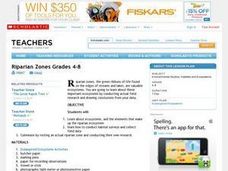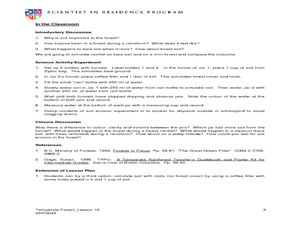Curated OER
The Great Ocean Conveyor
Students investigate water density. In this water density instructional activity, students conduct an experiment with food coloring, water and salt to see how the salt effects bodies of water.
Curated OER
Ocean Currents
Pupils examine ocean currents. In this investigative lesson, students examine ocean currents and the relationship between the ocean, our atmosphere, and the weather. They will create a model of an ocean current.
Curated OER
Survival Science: How Evaporation and Condensation Can Save Your Life!
Eighth graders demonstrate how scientific principles can be used to provide resources in an emergency situation. In this evaporation lesson students view a demonstration on a solar still and see a brief PowerPoint presentation.
Curated OER
Heat Transfer and Pollution
Pupils perform computer simulations on air dispersion. In this chemistry lesson, students calculate energy transfer based on specific heat and temperature change. They explain the causes of smog.
Curated OER
Your Own Greenhouse
Students discuss the similarities between the Earth's atmosphere and a greenhouse. For this science lesson, students make their own greenhouses out of plastic bottles and thermometers. Students record the temperature different times of...
Curated OER
Smog Be Gone
Students begin the lesson by identifying greenhouse gases. In groups, they observe and record the effect of the gases on the atmosphere and the temperature of the Earth. They participate in activities that describe the role of...
Curated OER
Discovering Albedo
Students read a thermometer accurately, collect and record data, and generate a graph based on data. They learn what independent and dependent variables are. They analyze data and make conclusions concerning how soil coverings affect...
Curated OER
Photosynthesis: Intake of Carbon Dioxide - Production of Oxygen
Students, after a long-term observation of photosynthesis with aquatic plants, assess the benefits of photosynthesis towards all living organisms. They explain in their own words the two cycles within photosynthesis. Guided discussion...
Curated OER
Does Humidity Affect Cloud Formation?
Learners use S'COOL data to identify factors that affect cloud formation. They find a data set using the S'COOL database , and use Excel to manipulate the data. Student isolate relevant data, create meaningful graphs from a spreadsheet,...
Curated OER
Dry Season and 'Green' Season in Costa Rica
Students explore the seasonal changes in Costa Rica. In this dry season lesson students use the Internet to locate science data then generate data for precipitation.
Curated OER
Living in the Greenhouse
Students discuss the different types of climate zones found throughout the world. They participate in activities which relate to real events. They make observations and the consequences of their actions on the environment.
Curated OER
Riparian Zones Grades 4-8
Students examine and analyze the Riparian Zones found on the edges of streams and lakes. They assess why those are such valuable ecosystems and then conduct actual field research on riparian zones and conclude by drawing conclusions from...
Curated OER
Dimming The Sun
Students review the meanings of global warming and global dimming. While watching a video, they take notes on different aspects of the issue. In groups, they develop a list on what can be done to reduce global dimming. They...
Curated OER
Mini-Ponds
In this mini pond worksheet, students create a mini-pond ecosystem with soil, water, and plant life. Students let their ecosystem sit for a day and they observe a sample the next day. Students identify all the pond water microorganisms...
Curated OER
Do You Need What I Need?
Student identify the basic human needs. In this life science lesson, 3rd graders compare the needs of plants, animals and humans. They apply what they have learned by playing a survival team game.
Curated OER
Thunderstorm Outflow I
Students study the characteristics of thunderstorms. They view an animation of radar reflectivity that depicts a thunderstorm and its outflow to locate the thunderstorm's outflow. Afterward, they explain what physical process occurs in a...
Curated OER
Weather, Sea Level Rise and Climate Change Course
Students explain the impact of glacial melting to global climate change. In this environmental science lesson, students design an experiment to investigate the effect of salinity change to melting glaciers. They share their results to...
Curated OER
Forest as a Filter
Students experiment using soil and water. In this forest as a filter lesson, students identify the role of forest cover, vegetation, and foliage impacts erosion and evaporation. Students conduct a simple experiment, form a hypothesis,...
Curated OER
The Greenhouse Effect in a Jar
Students explore climate change by participating in a physical science experiment. In this greenhouse effect lesson, students discuss the impact global warming has on our environment and how it works. Students utilize a glass jar,...
Curated OER
Three Methods of Heat Transfer
Students participate in a variety of experiments designed to illustrate types of heat transfer including conduction, convection and radiation. They complete worksheets as an assessment of the experiments.
Curated OER
Ozone Pollution: Smog Alert
Students examine factors the create smog. In this pollution lesson students complete an activity about ozone.
Curated OER
Cool Suits
Students examine the materials that are used to make space suits. They complete an experiment in which they test different materials in different colors to determine the best one for keeping astronauts comfortable. They analyze the data.
Curated OER
Does Humidity Affect Cloud Formation?
Pupils use NASA's S'COOL database to identify factors that affect cloud formation.
Curated OER
Thunderstorm Outflow
Students list at least three physical characteristics of a thunderstorm outflow. They explain what physical process occurs in a thunderstorm to create the storm's outflow, and locate the thunderstorm's outflow.

























